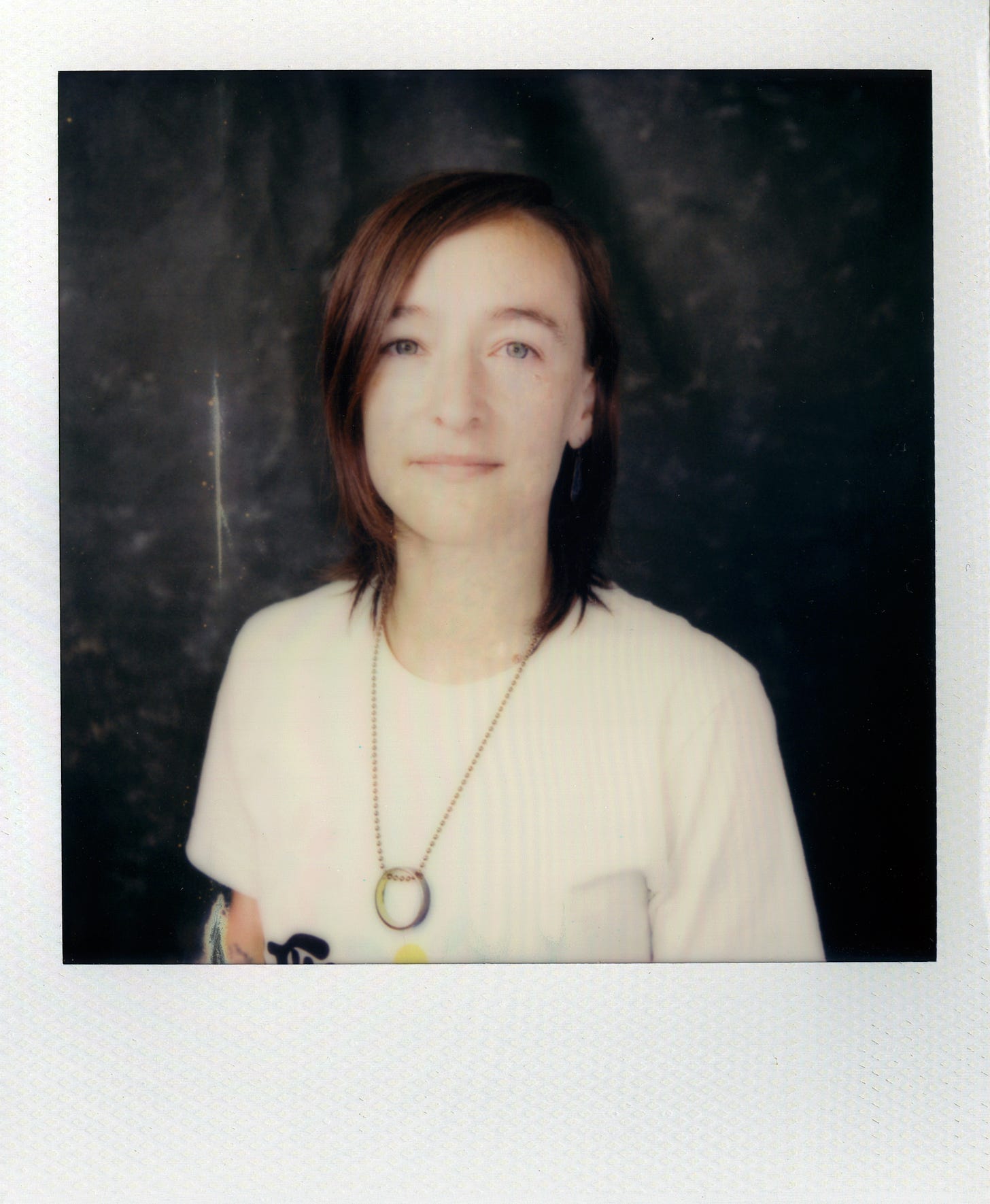Hello and welcome to Healing is My Special Interest — the newsletter at the intersection of late diagnosed neurodivergence and healing from high control environments. I am SO excited about today’s guest post, because it is a creative essay on a topic that I believe is close to the heart of so many late-diagnosed autistic people: skills regression, or the loss of previously held “abilities” to push through / multitask / mask. This essay by Sarah does such a great job of allowing for all of us to wonder at differing abilities and learning to listen to our bodies more than society. Thank you to everyone who supports this newsletter financially and allows me to pay autistic writers for their work!
The Body Responds
On skills regression, authenticity, and learning to recognize your interior world.
by Sarah Teresa Cook.
April 2024, post-diagnosis. Wednesday.
I walk a mile downhill from my house to the coffee shop, a large, mint green space on 2nd street. I’ve come at an awkward time of day; there are few people here.
I sit in a corner—corners have always felt safest to me—pull out my books, journal, some pens, and begin my day. A smattering of conversation wafts over from many tables away. I notice background noise from the kitchen, where steel things are being rinsed and bready things are being baked.
I reach for my earplugs—I have been wearing earplugs in public spaces like this one for a couple months now, as part of my attempt to better understand and manage my sensory sensitivities—but I’ve accidentally left them at home.
Oh well, I think honestly. I’ve been having days like this one long before I owned earplugs. In fact, before my Autism diagnosis, I’d never had any trouble with sound at all. Sure, I had trouble-trouble—emotional trouble, brain + thought trouble, anxieties in many different flavors. But nothing tied to sound.
I take a sip of my chai, try to focus on one book, then a different one. Something isn’t working. No, something is wrong.
I long for mere distraction, but what I feel instead is that every discrete sound in this room is penetrating a different corner of my tender brain.
The word “invasion” comes to mind. I almost begin to cry.
I gather my things and speed walk the mile back to my house, uphill.
——————————————————
Skills regression, simply put, refers to the loss of previously acquired skills and abilities.
Example: I used to not struggle to exist at coffee shops without some kind of ear protection.
Now, more often than not, I do.
Now, leaving the house without my earplugs and headphones is what I call a mistake.
Before? I didn’t call it anything.
——————————————————
January 2024. Pre-diagnosis. Tuesday.
My neurodivergent therapist is walking me through a series of sensory profiles as we navigate the diagnostic criteria for Autism. “Let’s talk about your relationship to clothing,” she suggests, and in order to provide an example—I often need an example of the thing in order to understand the thing—she mentions that Autists sometimes prefer tight clothing.
“No, that doesn’t sound like me at all,” I say with confidence, my nervous system calm.
“I do love wearing compression socks though,” I add quickly, claiming that I’d wear them everyday if I had enough pairs. “Oh, and I’ve done this thing for years where I wear a tight tank top under all my outfits, sometimes even when it’s really hot out.” One time I asked my partner, M, if he could take some recycling to the porch for me because I didn’t have a shirt on, to which he pointed out that I was wearing a tank top: This is how merged I am with these tight undergarments.
“So,” my therapist gently offers, “it sounds like maybe you do have a relationship with tight clothing?”
Another way to say it: Skills regression is what happens when you notice that some of the stories you tell yourself about yourself aren’t accurate, just familiar.
——————————————————
Here’s one Reddit user, jvc28373, talking about their own experience of the term:
I was diagnosed nearly a year ago and have since had to give up work due to burnout. While trying to recover I've noticed mild to severe regression with skills and tasks I've managed to do in the past with ease. I was discussing this with a friend and he said he suggested that I need to "relearn" or "retrain" myself to do things now unmasked since I was masked when I first learned them (emphasis mine).
That masked → unmasked transition is an important one, and it speaks to the primordial damage that camouflaging—and its subcategories of compensation, assimilation, and masking—can produce for the undiagnosed Autistic person.
Another Reddit user, Lexocracy, posting in the “Autism In Women” thread, describes the brain as made up of a series of towns, each one representing a skill or ability and connecting to every other one via a series of highways, aka synapses. When we receive a later-in-life diagnosis, she says, our established routes come into question:
Do I actually like going to gatherings with friends and getting good food or was that just the easiest way to mask to be a part of society? Did I really enjoy painting or was that just a way to regulate my emotions at night and it was the most accessible and the thing I did as a kid so it stuck?
All of those questions will create doubt around your whole being and perspective. Suddenly, every single one of those efficient roads that kept you going every day has been blocked off by road construction and you can no longer access that town. The towns are still there, but you have a really rough route getting there as your learned experience is no longer accessible to you.
I like this word, “accessible.” I like the spaciousness it creates between me and my abilities & accomplishments, as if whatever’s in regression never accounted for the full substance of who I was, anyway.
——————————————————
July 2024, post-diagnosis. Friday.
My partner and I head into Portland for dinner & a show with two dear friends. The entire drive is relaxed, full of good music. My feet occasionally find the dashboard.
Five minutes away from our destination, something happens. “Roll the windows up,” I assert, the noise of our car on the asphalt suddenly the worst noise I have ever heard. “Can we turn the music off?” I wonder if I’m overwhelmed from being in the car too long—though this drive, both in length and route, is a highly familiar one.
We park. I step outside, pace a little. It doesn’t help. I walk; nothing feels better.
And then, as if a beacon has gone off in my brain, I turn to M and say that I need to go to a coffee shop right away. There, I order a ginger tea, find a corner, and sit down. “I think we need to cancel dinner,” I tell him, before putting my headphones on and turning sharply away; the implication would be clear even to a stranger: There is nothing more I can give you at this time. Binaural beats play at full volume in my ears. I hold a book directly in front of my face, let my body rock from side-to-side.
However unkind I may have seemed, they were calculated decisions. Some part of me knew that I had to save every ounce of social energy I had left if I was going to make it to the show, the whole reason for our 1.5 hour drive into town. Which meant no dinner with friends. And which meant, between now and then, staying in my book-headphone-coffee shop bubble and swaying in public, ignoring my partner as I ran the tips of my fingers again and again over the nail beds on each thumb: clockwise with my left hand, counterclockwise with my right.
Another way to say it: Skills regression involves the phenomenon of acting more Autistic after you’ve learned that you are Autistic.
——————————————————
June 2024, post-diagnosis. Monday.
I am worrying out loud to my partner about this whole acting more Autistic thing, scared that I must be faking it.
It is very useful to receive a life-changing diagnosis while in a 10-year relationship, because if there’s any person in this world who will not be surprised to learn of my Autism, it is the person who has lived with me, seen all my private, unmasked ways of being, and observed the meltdowns and shutdowns long before I knew what to call them.
Needless to say, he was not surprised.
So when I worry-complain about my Autism being fake, he always says something helpful.
It’s like when someone discovers they have Celiac disease, he tells me one day:
Sure, they’ve eaten bread their whole life, feeling crummy and unwell. But they didn’t know about the connection. This is just what it feels like to be a person, they probably thought.
When they finally stop eating gluten, everything gets better. And then, one day, they decide to eat a piece of bread, remembering the crummy and unwell but tolerable feeling they handled for years. Except this time, they don’t feel crummy and unwell. They feel absolutely horrific, so much worse than they ever did before.
Their body had responded to the accommodations, and it no longer knew what to do without them.
Another way to say it: Even when initiated later in life, the body responds positively to the new meeting of old needs.
Thank gawd the body responds.
Another way to say it: Skills regression is just the body’s response to the possibility of increased care.
——————————————————
Sometimes I wonder if there’s no regression taking place in me after all. Maybe it’s just that I’m finally catching up with a truer—albeit slower and needier—part of myself. As if catching up can also be a kind of catching back.
Sometimes I wonder how any of this could be called regression when what’s happening, me learning to better address my needs, feels so much more like cohesion?
Sometimes I wonder if my tendency to analyze (#actuallyautistic), paired with my tendency to intellectualize (#academicwounds), paired with the 20-year-old feeling that I am someone who lives entirely inside their head (#C-PTSD), has kept me reading my troubles rather than feeling and experiencing them.
I think there’s a big difference.
In the one, you see your internal landscape as a thing you must constantly overcome.
In the other, you just get to live there.
Sometimes I wonder if a common consequence of being highly masked is that you learn to only spot your needs in their most extreme iterations. Sometimes I wonder if the result of this is the assumption that we must feel bad enough to warrant meeting said needs. And sometimes I wonder if, once we start meeting said needs sooner, in their earlier, softer iterations, we mistakenly read this as regression.
Sometimes I wonder if acting more Autistic isn’t accurate language, given that there’s nothing “more” about it.
It has nothing to do with amount. It has to do with place.
It is a geographical thing.
I am placing my insides, as-is, more firmly into the world.
I am letting the world meet me where I am, in here [gestures toward the heartbody].
Sometimes I wonder if a subconscious part of me is acting more Autistic in order to earn this newfound truth, in order to prove that my body is an accurate map.
To prove the body’s accuracy. What bad man invented such a thing?
Then I remember that being an undiagnosed, masked Autistic person for more than three decades, one raised female in a deeply gendered society, means I’ve always felt the too-large rift between my internal world and the external one; between what I can see, and what everyone else can.
Between what I am, and how I seem.
Some of us can’t be contained by the seems.
——————————————————
Another way to say it: Skills regression is the consensual unthreading of all the seams that were about to burst anyway.
Another way to say it: Let them burst.
Sarah Teresa Cook is an Autistic writer, poet, and creative mentor. She lives in the Pacific Northwest, where she watches scary movies, dreams of writing the "before & after" puzzles for Wheel of Fortune, and subscribes to a mail order sticker club. More words can be found in Hobart Pulp, Write or Die Magazine, Neon Door, and Sad Girl Diaries, or in her Substack, For the Birds. For everything else, visit sarahteresacook.com.







